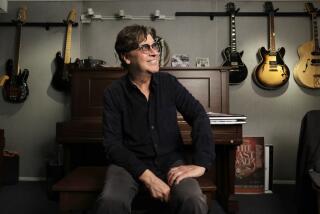National’s Treasure
- Share via
Bob Brozman can hardly contain his enthusiasm about music, in particular his devotion to the National line of metal-bodied stringed instruments.
It’s easy to see how this ethnomusicologist could write volumes about it, and that’s exactly what he did in his 300-page book, “The History and Artistry of National Resonator Instruments,” (Centerstream, 1993).
Brozman will be playing some of these revered instruments when he appears in concert Friday night at Shade Tree Stringed Instruments in Laguna Niguel. Included among them from his collection of about 100 instruments will be a mandolin, ukulele and two guitars. The 42-year-old entertainer sings, too, encompassing deep-throated blues, jazz scatting and yodeling.
Brozman’s mixture of American and world-music styles, first captured on a 1974 album titled “Your Pal,” encompasses old-style folk, jazz and blues, plus African, Caribbean, Hawaiian and Django Reinhardt-style swing. Songs include traditionals and Brozman originals.
He recently completed a World of Slide Guitar tour with critically praised guitarist Martin Simpson and Indian musician Debashish Bahttacharya. Brozman and Simpson also have collaborated on an album scheduled for release later this year.
What does all this add up to in concert?
“After the first five or six songs, people look at me in kind of a stunned way,” said Brozman by phone from his home near Santa Cruz. “I don’t mind. I want them to be a little bit overwhelmed. I think by the end of the night, though, they wind up laughing more than perhaps they expected to.”
Brozman, whose serious, scholarly look belies his good-humored character, likes to entertain as well educate his audience. He describes himself as “a maniacal ethnomusicologist” and says humor and accessibility are just as important as possessing a trunkload of knowledge and skill.
“About 25 years ago, I saw this guitar player--who shall remain nameless--where in the middle of his show, he stopped and said, ‘I’m not gonna play anymore unless you people quiet down and listen,’ ” Brozman recalled. “I realized then that it’s not the audience’s responsibility to be quiet; it’s the performer’s [responsibility] to be interesting enough to hold their attention.”
In concert, Brozman supplements his sensual, dexterous fretwork with “odd, funny little stories that make you scratch your head” while poking fun at selected icons of popular culture--and at himself.
“The trick is to share your talent and knowledge with a sense of humor and without sounding like a know-it-all,” said Brozman, who has been playing guitar since he was 6. “There are a lot of guitar egomaniacs out there, and the world doesn’t need another one.”
It was during Brozman’s formative years in New York that he discovered the National guitar.
“I first encountered one when I was 14 or 15, you know, when your hormones are raging and you’ll get attached to something for life,” he said with a laugh. “As a musician, what I like about them sonically is that they have a very wide dynamic range.
“With a wooden acoustic guitar or a solid-body Les Paul, the difference in sound between your softest touch and hardest hit is not that great. But with a National, you can go from a whisper to a roar” without any amplification.
Production ended when the Los Angeles-based National String Instrument Co. went out of business in 1941. The instruments have since become prized collectors’ items, selling for as much as $30,000.
Brozman, recognized as the authority on National instruments since the 1988 death of founder John Dopyera (who, with his brother, Rudy, also created the resonater Dobro guitar), has played a pivotal role in a new phase of production.
In 1988, Don Young and MacLean Gaines launched their own National Resophonic Co. in San Luis Obispo. They turned to Brozman for his expertise and guidance during pre-production. Brozman said the recent-vintage Nationals sell for $1,500 to $2,000.
“Back in the late ‘80s, these two guys sent me prototypes, came up to my place and tore apart and measured my personal collection of [National] instruments,” Brozman said. “They really took their time to get it right.
“So [the instruments have] been reintroduced over the last couple of years, and now you can get a new National that sounds like the old ones . . . and in some ways, is even better in terms of playing more in tune and being problem free.
“[Young] is a very good player himself, so he knows what qualities other players are looking for in a guitar.”
What Brozman is in search of is a way to expand his small audience in the U.S. Here, he performs only about six weeks per year at venues ranging from folk and blues festivals to the cozier confines of clubs and coffeehouses.
He has built a much larger following in Europe through recordings for London-based Virgin Records and frequent tours, for which he routinely plays theaters for three weeks at a time in France, Germany and England.
“I’m trying to be more active in the States, but I’m so heavily booked in Europe these days,” he said. “I think part of the reason I’m more popular over there is that European countries still embrace cultural differences and value tradition and history a bit more.
“American culture, including art, film and music, is trivialized and homogenized for mass consumption. If it can’t be mass-marketed, it’s dismissed as [being] commercially and culturally irrelevant, and that’s a shame.”
Nonetheless, and because of his loyal European fan base, Brozman enjoys an annual six-figure income without having to worry about commercial trends at home.
“I am one of the luckiest guys I know,” he said. “This may sound corny, but I truly love playing music, and I’ve never had any other job. I’ve also never had to compromise my artistic integrity. To me, that means a lot.”
* Bob Brozman plays Friday at Shade Tree Stringed Instruments, 28062 Forbes Road, Laguna Niguel. 7:30 and 9:30 p.m. $18. (714) 364-5270.
More to Read
The biggest entertainment stories
Get our big stories about Hollywood, film, television, music, arts, culture and more right in your inbox as soon as they publish.
You may occasionally receive promotional content from the Los Angeles Times.










